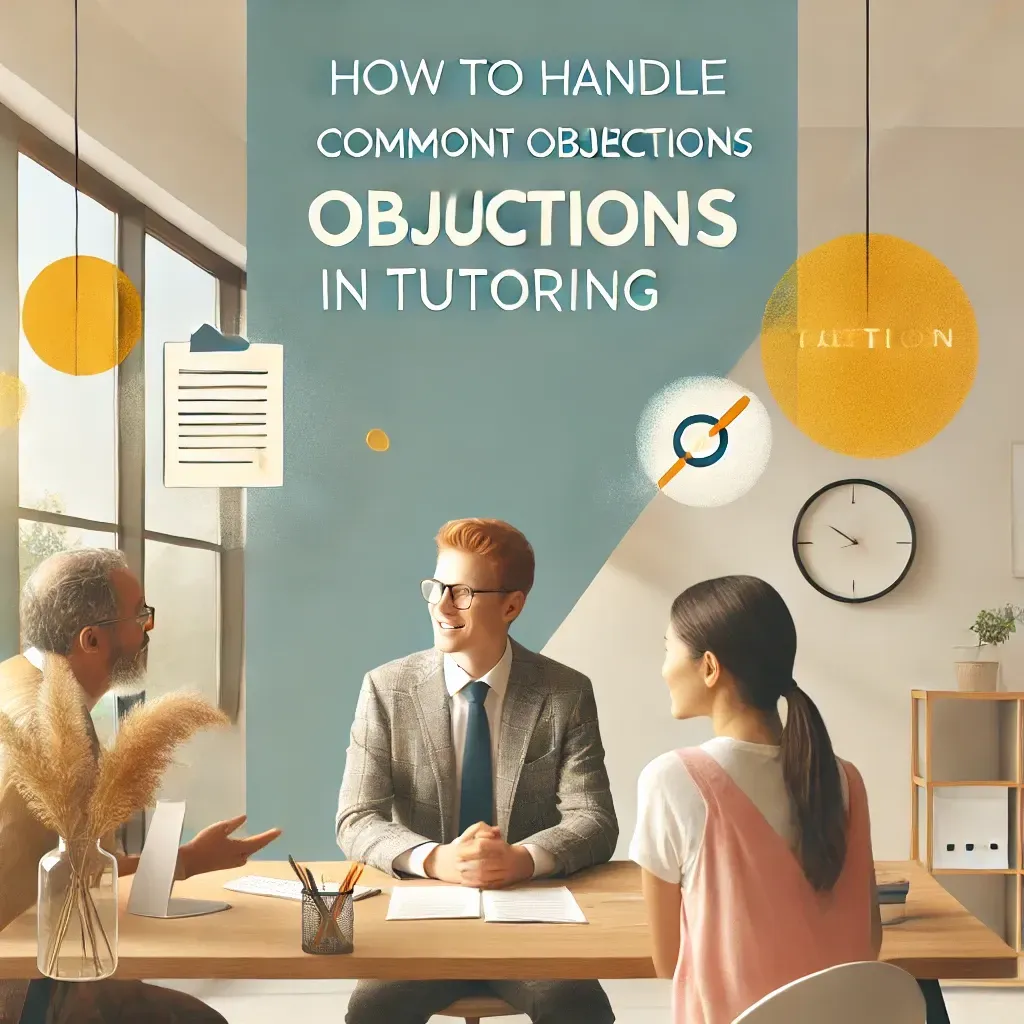
How to Handle Common Parent Objections in Tutoring
"Objections are not rejections. They’re just unanswered questions." – Grant Cardone
How to Handle Common Parent Objections in Tutoring
Introduction: The Real Reason Parents Say “No”
You’ve probably been on a consultation call where everything seemed to be going well—until the parent hit you with a hesitant "We’ll think about it" or a blunt "That’s too expensive."
At that moment, it’s easy to feel like the sale is lost. But here’s the thing: Objections aren’t rejections. They’re simply questions in disguise.
Parents want the best for their child, but they also have concerns—about money, time, effectiveness, or even their child’s willingness to participate. Your job is to guide them through those concerns with confidence and clarity.
In this post, we’ll break down the five most common objections parents raise and give you the exact strategies to handle them. By the end, you’ll be able to close more enrollments without sounding pushy.
The 5 Most Common Parent Objections (And How to Overcome Them)
1. “It’s too expensive.”
Why They Say This:
Parents aren’t necessarily saying they can’t afford it. They’re saying they’re not yet convinced that the price matches the value.
How to Respond:
✅ Acknowledge their concern: “I totally understand that cost is a big factor when making this decision.”
✅ Show the long-term value: Instead of focusing on price, highlight the transformation:
➡ “This isn’t just about better grades—it’s about giving your child confidence in learning and setting them up for future success.”
✅ Compare it to other expenses:
➡ “Many parents invest in sports or music lessons, but improving their education will impact them for life.”
✅ Offer payment flexibility: If you have installment plans, trials, or scholarships, now’s the time to mention them.
🎯 Example Response:
"I understand that budget is a concern! But think of it this way—many families spend hundreds on entertainment or extracurriculars each month. The skills your child gains here will last a lifetime. Plus, we offer flexible payment plans to make it easier for families."
2. “We’re not sure if tutoring will work.”
Why They Say This:
They’re worried about wasting time and money on something that might not help their child.
How to Respond:
✅ Show real results: Share testimonials or data about student progress. Parents trust proof.
✅ Explain your process: Make it clear how you identify weaknesses and tailor sessions to each student.
✅ Offer a trial or guarantee: If possible, offer a free or discounted first session so they can experience the value firsthand.
🎯 Example Response:
"I totally get it—parents want to make sure this actually works. That’s why I customize each lesson to your child’s learning style. In fact, 90% of my students see at least a 1-grade level improvement in just a few months. If you’d like, we can start with a trial session and go from there!"
3. “We’re too busy.”
Why They Say This:
Between school, sports, and family time, adding tutoring might seem overwhelming.
How to Respond:
✅ Show how tutoring can actually save time: A structured learning plan reduces frustration and long hours spent struggling with homework.
✅ Highlight flexible scheduling: Mention evening, weekend, or online options that work around their schedule.
✅ Compare time spent now vs. later: Without tutoring, their child might continue struggling, requiring even more time down the road.
🎯 Example Response:
"I hear you! Life is busy, and that’s exactly why tutoring helps—your child will actually spend LESS time struggling with homework and more time enjoying family activities. We also offer flexible scheduling, including evenings and weekends, to make it work for you!"
4. “We want to think about it.”
Why They Say This:
This is often a polite way of saying, “We’re not convinced yet.”
How to Respond:
✅ Uncover their true hesitation: Ask, “What’s your biggest concern right now?” so you can address it directly.
✅ Create urgency: Let them know if spots are limited or if pricing may change.
✅ Follow up with additional information: A helpful email, a success story, or a video testimonial can keep the conversation going.
🎯 Example Response:
"Totally understandable! Just so I can help, is there anything specific that’s holding you back? Also, I want to mention that I only have a few spots available this month, so if you'd like to secure a trial session, I’d recommend booking soon!"
5. “Can’t we just do this ourselves?”
Why They Say This:
Some parents believe they can tutor their child on their own or find free resources online.
How to Respond:
✅ Explain the difference between casual help and structured tutoring: Many parents struggle to teach their own child effectively.
✅ Show the benefits of expertise: Tutors provide personalized strategies and accountability that DIY methods lack.
✅ Compare results: If they’ve already tried teaching their child at home with limited success, remind them that professional support can make a huge difference.
🎯 Example Response:
"I totally get it! But as a tutor, I use proven strategies that aren’t always easy to find online. Plus, I take the pressure off parents so you don’t have to battle over homework. Most families find their child makes much faster progress with professional guidance!"
Final Thoughts: Confidence is Key
Handling objections isn’t about convincing parents to do something they don’t want—it’s about helping them make the best decision for their child. When you approach objections with confidence, clarity, and real solutions, you’ll build trust and increase enrollments.
Next Steps:
✅ Practice these responses so you feel prepared for your next consultation call.
✅ Watch the video below to see how to handle these objections in action!
And if you want to enroll more students automatically without doing all the hard work yourself, check out TutorMax.io! 🚀
